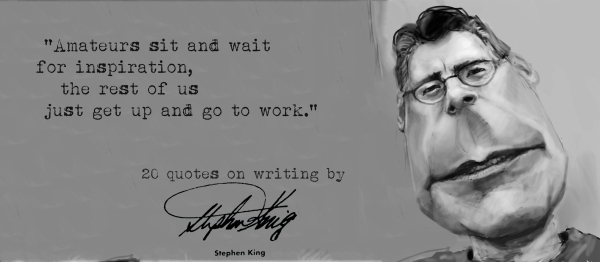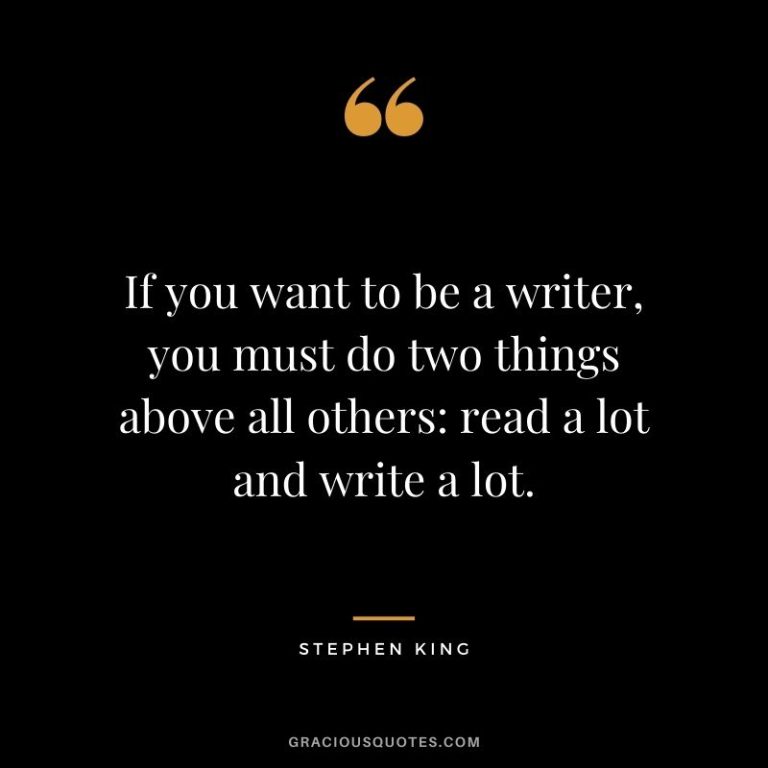Stephen King Quotes: Lessons In Writing Dialogue And Voice
If you’ve ever been captivated by the chilling prose of Stephen King, then you know that his writing is more than just scary stories. It’s an art form, a masterclass in crafting dialogue and voice that pulls readers in and keeps them hooked until the very last page. In this article, we’ll delve into some of Stephen King’s most insightful quotes about writing dialogue and voice. So, grab your pen and paper, because these lessons are sure to inspire and empower you on your own writing journey.
When it comes to writing dialogue, Stephen King knows a thing or two. As a master storyteller, he understands the power of authentic and compelling conversations between characters. In his own words, he once said, “Dialogue is a way to bring characters to life. It’s not just about what they say, but how they say it.” And he’s absolutely right. Dialogue should reflect the unique personalities and perspectives of your characters, allowing readers to connect with them on a deeper level. So, whether you’re crafting a heart-pounding thriller or a tender love story, Stephen King’s wisdom will guide you in creating dialogue that resonates with your readers and brings your characters to life.

Stephen King Quotes: Lessons in Writing Dialogue and Voice
Stephen King, the acclaimed author of numerous bestselling novels, is known for his ability to captivate readers with his compelling storytelling and vivid characters. One aspect of his writing that stands out is his mastery of dialogue and voice. King’s quotes on writing dialogue and voice offer valuable insights and lessons for aspiring writers looking to improve their craft. In this article, we will explore some of Stephen King’s most noteworthy quotes on writing dialogue and voice, highlighting the lessons they impart.
The Importance of Authentic Dialogue
One of the key lessons Stephen King teaches us is the importance of authentic dialogue. He emphasizes the need for dialogue that sounds natural and reflects the way people truly speak. King believes that realistic dialogue helps immerse readers in the story and brings characters to life. He advises writers to listen carefully to how people converse and incorporate that realism into their own writing. By doing so, writers can create dialogue that feels genuine and resonates with readers.
Furthermore, King stresses the significance of avoiding excessive dialogue tags and unnecessary adverbs. He encourages writers to rely on strong dialogue and context to convey the emotions and intentions of the characters. By using dialogue effectively, writers can enhance the pacing and flow of their narratives, engaging readers on a deeper level.
Creating Distinctive Voices for Characters
In addition to authentic dialogue, Stephen King emphasizes the importance of developing distinctive voices for each character. He believes that every character should have a unique way of speaking that reflects their personality, background, and motivations. King advises writers to pay attention to the specific word choices, speech patterns, and rhythms that define each character’s voice.
King’s quotes on creating distinctive voices highlight the power of language in shaping characters and their relationships. By crafting individual voices, writers can differentiate characters and add depth to their interactions. The way characters speak can reveal their inner thoughts, emotions, and conflicts, allowing readers to form strong connections with them.
The Role of Dialogue in Advancing the Plot
Stephen King also emphasizes the role of dialogue in advancing the plot. He believes that dialogue should serve a purpose beyond mere conversation. Effective dialogue should reveal information, deepen conflicts, and drive the story forward. King advises writers to use dialogue strategically to reveal character motivations, expose secrets, and create tension.
Furthermore, King suggests that writers can use dialogue to convey subtext and hidden meanings. By incorporating subtle hints and double entendres into their characters’ conversations, writers can add layers of complexity to their narratives. This allows readers to engage in a deeper level of interpretation and analysis, enhancing their overall reading experience.
Dialogue vs. Description: Striking a Balance
While dialogue is crucial, Stephen King also emphasizes the importance of balancing dialogue with descriptive passages. He advises against relying solely on dialogue to convey information or set the scene. King encourages writers to find a balance between dialogue and description, allowing each element to complement and enhance the other.
By skillfully integrating dialogue and description, writers can create a rich and immersive reading experience. Descriptive passages can provide important context, evoke emotions, and establish the atmosphere, while dialogue brings characters to life and drives the narrative forward. The interplay between dialogue and description is a powerful tool in the hands of a skilled writer.
The Value of Stephen King’s Lessons
Stephen King’s quotes on writing dialogue and voice offer valuable lessons for aspiring writers. By emphasizing the importance of authentic dialogue, distinctive character voices, and the strategic use of dialogue to advance the plot, King provides valuable insights into the craft of writing. Writers can learn from his techniques and apply them to their own work, creating compelling narratives that resonate with readers.
So, whether you’re a fan of Stephen King’s novels or simply seeking guidance on improving your writing, take these lessons to heart. Embrace the power of authentic dialogue and distinctive voices, and let Stephen King’s wisdom guide you on your writing journey.
Key Takeaways: Stephen King Quotes – Lessons in Writing Dialogue and Voice
- 1. Dialogue should reveal character traits and move the story forward.
- 2. Use natural and authentic language to make dialogue realistic.
- 3. Avoid excessive dialogue tags and let the dialogue itself convey emotions.
- 4. Create distinct voices for each character to make them memorable.
- 5. Show, don’t tell, through dialogue to engage readers and bring scenes to life.
Frequently Asked Questions
1. How can Stephen King’s quotes help improve my writing dialogue?
Stephen King is known for his masterful use of dialogue in his novels. By studying his quotes on writing dialogue, you can gain valuable insights into how to create realistic and compelling conversations between your characters. King emphasizes the importance of using authentic language, avoiding excessive dialogue tags, and capturing the unique voice of each character. By applying these principles, you can elevate your writing and make your dialogue more engaging and believable.
Additionally, King’s quotes on writing dialogue can inspire you to think outside the box and experiment with different techniques. He encourages writers to listen to real conversations, study the way people speak, and infuse their dialogue with personality and emotion. By incorporating these techniques into your own writing, you can create dialogue that feels natural and resonates with readers.
2. What can I learn from Stephen King’s quotes about voice in writing?
Voice is a crucial element in storytelling, and Stephen King offers valuable insights on how to develop a strong and distinctive voice in your writing. His quotes emphasize the importance of finding your own unique voice and staying true to it. King encourages writers to write from the heart, be authentic, and not to try to imitate other authors.
In his quotes, King also highlights the significance of creating memorable characters with distinct voices. He suggests giving each character their own way of speaking and thinking, which adds depth and authenticity to their portrayal. By studying King’s quotes on voice, you can learn how to create compelling and individualistic characters that readers will remember.
3. How can I apply Stephen King’s advice on writing dialogue and voice to my own work?
To apply Stephen King’s advice on writing dialogue and voice to your own work, start by analyzing his quotes and identifying the key principles he emphasizes. Focus on incorporating authentic language, avoiding excessive dialogue tags, and capturing the unique voice of each character in your dialogue.
When it comes to voice, take King’s advice to heart and find your own unique writing style. Write from the heart, be authentic, and develop distinctive voices for your characters. Experiment with different techniques and study how real people speak to make your dialogue and characters feel more genuine. By applying these principles and techniques, you can improve the quality and impact of your writing.
4. Can Stephen King’s quotes on writing dialogue and voice benefit writers of all genres?
Absolutely! Stephen King’s quotes on writing dialogue and voice are applicable to writers of all genres. While King is known for his horror novels, his advice transcends genre boundaries. The principles he shares can be applied to any form of storytelling, whether it’s fantasy, romance, mystery, or science fiction.
Good dialogue and strong voice are universal elements of effective writing, and King’s insights can help writers in any genre elevate their storytelling. By studying his quotes and applying his advice, you can improve your dialogue and voice, regardless of the genre you write in.
5. What is the significance of studying quotes from Stephen King on writing dialogue and voice?
Studying quotes from Stephen King on writing dialogue and voice can be highly beneficial for aspiring writers. King is a master of storytelling, and his quotes offer valuable lessons and insights into the craft of writing. By studying his advice, you can learn from a seasoned and successful author, gaining inspiration and guidance for your own writing journey.
Furthermore, King’s quotes on writing dialogue and voice can help you develop a better understanding of the techniques and strategies used by accomplished authors. They provide a roadmap for honing your skills, improving your writing, and creating more engaging and impactful stories. By studying and applying King’s advice, you can enhance your writing abilities and increase your chances of success in the world of literature.
Stephen King on writing; why he never uses a notebook and other tips from the top!
Final Summary: Stephen King Quotes for Writing Dialogue and Voice
So, there you have it! We’ve delved into the world of Stephen King quotes and explored the valuable lessons they offer when it comes to writing dialogue and voice. Throughout this article, we’ve seen how King’s insights can help us create compelling characters, realistic conversations, and distinctive narrative voices.
One of the key takeaways from Stephen King’s quotes is the importance of authenticity in dialogue. By embracing the natural rhythm, slang, and idiosyncrasies of everyday speech, we can bring our characters to life and make their interactions feel genuine. King reminds us to listen to the world around us, paying attention to the way people actually talk, and infuse that realism into our writing.
Additionally, King emphasizes the significance of developing a unique voice as a writer. He encourages us to embrace our individuality, quirks, and personal experiences, as they can shape our storytelling style. By finding our own voice, we can create narratives that are distinct and memorable, setting ourselves apart in the crowded literary landscape.
In conclusion, Stephen King’s quotes serve as invaluable lessons for writers seeking to improve their dialogue and voice. By staying true to the authenticity of speech and nurturing our own unique narrative style, we can create stories that resonate with readers and leave a lasting impact. So, let’s take these insights to heart and embark on our writing journey with confidence and creativity. Happy writing!






